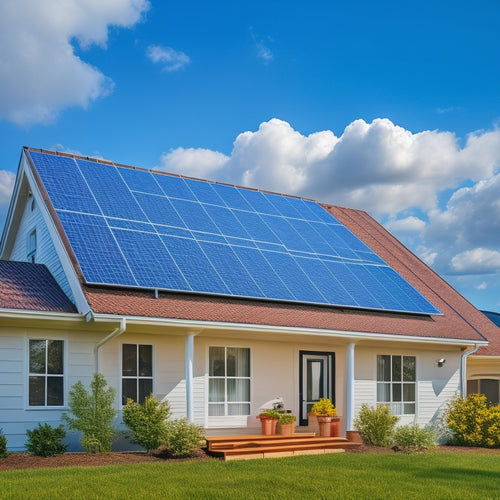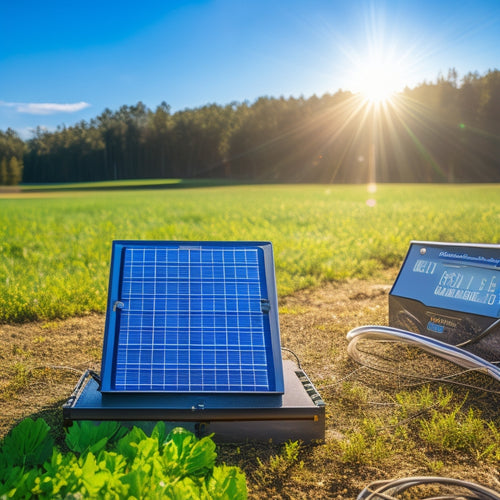
Top Home Solar Battery Backup Choices
Share
When selecting a top-rated home solar battery backup system, you'll want to evaluate brands like Tesla, LG, and Sonnen, which offer high-performance batteries with eco-friendly innovations, system integration compatibility, and high-depth-of-discharge ratings. You'll also need to choose between deep cycle battery options like flooded lead-acid, sealed lead-acid, and lithium-ion, assessing factors like lifespan, maintenance, and performance. As you investigate lithium-ion battery backup systems, lead-acid battery storage solutions, and cost analysis, you'll find that each option has its advantages and disadvantages. Now, uncover the key features and monitoring capabilities that'll help you make an informed decision that meets your specific needs.
Key Takeaways
- Top-rated solar battery brands like Tesla, LG, and Sonnen offer high-performance batteries with eco-friendly innovations and extensive warranties.
- Lithium-ion batteries provide higher energy density and longer lifespans, but lead-acid batteries are a cost-effective alternative with lower maintenance needs.
- Home solar battery backup options like Tesla Powerwall, LG Chem RESU, and Sonnen's eco battery offer varying capacities, features, and warranties to suit specific needs.
- Depth of backup capacity, measured in kWh, determines the duration of power during outages, with higher capacities supporting more appliances and longer backup times.
- Advanced monitoring capabilities in top solar battery backup systems track energy production, storage, and consumption in real-time, ensuring peak performance and reliable backup power.
Top Rated Solar Battery Brands
When selecting a home solar battery backup system, the quality of the solar battery brand plays an essential role in ensuring a reliable and efficient energy storage solution.
You should look for brands that prioritize solar battery innovations, focusing on eco-friendly batteries that minimize environmental impact.
Top-rated brands like Tesla, LG, and Sonnen offer high-performance batteries with advanced features like lithium-ion technology and intelligent monitoring systems.
They also consider key features such as system integration compatibility and high-depth-of-discharge (DOD) ratings to increase usable energy.
These brands also provide extensive warranties and dedicated customer support, ensuring your investment is protected.
Best Deep Cycle Battery Options
You're likely considering different deep cycle battery options for your home solar battery backup system, and it's vital to understand the key differences between them.
You'll need to evaluate battery types, such as flooded lead-acid, sealed lead-acid, and lithium-ion batteries, to determine which one best suits your needs.
Expectations around battery lifespan also vary considerably depending on the type and quality of the battery, so it's important to set realistic expectations for your system's performance.
When selecting a deep cycle battery, consider factors like maintenance frequency and performance management to guarantee peak battery health.
Additionally, compatibility and brand considerations play a considerable role in seamless system integration.
Battery Types Compared
By now, you've likely narrowed down your search for the perfect home solar battery backup system to a few top contenders, but the type of deep cycle battery to use remains an essential decision.
You'll need to evaluate factors like battery efficiency, installation considerations, and overall performance.
Lead-acid batteries, such as flooded and sealed varieties, offer a cost-effective option with well-established manufacturing processes. However, they may require more maintenance and have lower energy density.
Lithium-ion batteries, on the other hand, boast higher energy density and longer lifetimes, but come at a higher upfront cost.
You must weigh the trade-offs between these options to determine which best suits your specific needs and budget.
Battery Lifespan Expectations
Among the critical factors to contemplate when evaluating battery lifespan expectations is the number of charge cycles a deep cycle battery can handle before its capacity degrades.
Typically, a high-quality deep cycle battery can last for 5,000 to 7,000 charge cycles, translating to 10 to 15 years of service life.
However, this lifespan can be greatly impacted by factors such as temperature, depth of discharge, and battery maintenance tips.
You should also consider warranty considerations, as a thorough warranty can provide peace of mind and protect your investment.
When selecting a battery, look for products with a long warranty period, typically 10 years or more, to guarantee you're covered in case of premature degradation.
Lithium-Ion Battery Backup Systems
Opting for a lithium-ion battery backup system means leveraging the latest advancements in energy storage technology to safeguard your home against power outages.
With a lithium-ion system, you'll experience numerous benefits, including:
- High energy density, allowing for more power in a smaller footprint
- Longer cycle life, resulting in a longer-lasting system
- Low self-discharge rates, ensuring your batteries remain charged when needed
- Fast charging capabilities, getting you back up and running quickly
- Environmentally friendly, with a lower carbon footprint compared to traditional lead-acid batteries
When selecting a lithium-ion battery, evaluate top-rated brands like Tesla and LG, recognized for their innovative technology and performance.
It's also important to assess brand reputation by researching customer feedback and product longevity.
However, it's vital to evaluate the lithium disadvantages, such as higher upfront costs and potential thermal runaway risks.
Assessing the lithium advantages and disadvantages will help you determine if a lithium-ion battery backup system is the right choice for your home.
Lead-Acid Battery Storage Solutions
As you weigh your options for home solar battery backup systems, lead-acid battery storage solutions emerge as a tried-and-true alternative to lithium-ion technology.
Lead-acid batteries have been around for over a century, and their familiarity breeds a certain level of comfort. One of the lead acid advantages is their relatively low upfront cost, making them an attractive option for those on a budget.
In addition, they're well-established, with a wide range of manufacturers and suppliers available, such as Rolls Deep Cycle Batteries offering up to 5,000 cycles at 50% DOD.
Moreover, maintenance frequency plays an essential role in ideal battery health, with monthly checks recommended for voltage and watering.
However, lead acid disadvantages include a shorter lifespan, typically ranging from 5-7 years, and a lower depth of discharge, which affects their overall efficiency.
Despite these limitations, lead-acid batteries remain a reliable choice for homeowners seeking a cost-effective solar battery backup solution.
Solar Power Battery Cost Analysis
When evaluating home solar battery backup systems, understanding the costs involved is essential for making an informed decision.
You'll need to take into account the upfront expenses, including installation costs, as well as ongoing expenses like maintenance and replacement.
- The cost of the battery itself, which can range from $5,000 to $15,000 or more, depending on the type and size
- Installation costs, which can add another $2,000 to $5,000
- Incentives analysis, such as federal and state tax credits, which can help offset the upfront costs
- The cost of a charge controller and inverter, which can add another $1,000 to $3,000
- Ongoing maintenance and replacement costs, which can vary depending on the system's lifespan and performance
Home Energy Storage System Reviews
With numerous home solar battery backup options available, you're likely wondering which systems are worth considering.
To help you make an informed decision, we've reviewed top energy storage systems that provide energy independence and take advantage of renewable incentives.
The Tesla Powerwall is a popular choice, offering 13.5 kWh of storage and sleek design.
The LG Chem RESU is another contender, boasting a high depth of discharge and compatibility with various inverters.
Sonnen's eco battery is a premium option, featuring advanced smart grid capabilities and a 10-year warranty.
SimpliPhi's lithium-ion batteries offer a high power density and flexible installation options.
These systems vary in price, features, and performance, but all are designed to optimize your solar energy usage and reduce reliance on the grid.
Battery Backup System Features Compared
You'll want to carefully consider the depth of backup capacity when choosing a battery backup system, as it directly affects how long you'll have power during an outage.
You should also look at the system's monitoring capabilities, which can provide beneficial information into your energy usage and storage patterns.
Depth of Backup Capacity
The depth of backup capacity, measured in kilowatt-hours (kWh), determines how long a solar battery backup system can power your home during an outage.
This feature is essential as it directly affects the backup duration. You'll want to take into account a system with high capacity efficiency to guarantee you get the most out of your backup power.
- A 5 kWh system might power your essential appliances for a few hours
- A 10 kWh system could keep your lights, fridge, and computers running for a full day
- A 15 kWh system might support heavy loads like HVAC systems for several hours
- A 20 kWh system could provide a full day of backup power for a small to medium-sized home
- A 30 kWh system or larger might be necessary for larger homes or those with high energy demands
System Monitoring Capabilities
Modern solar battery backup systems come equipped with advanced system monitoring capabilities, allowing homeowners to track their energy usage and backup performance in real-time.
With this technology, you can monitor system performance, identifying areas of inefficiency and making adjustments to optimize energy production and storage.
Advanced monitoring technology provides detailed observations into your energy usage patterns, helping you make informed decisions about your energy consumption.
You'll have access to real-time data on your energy production, storage, and consumption, enabling you to fine-tune your system for maximum efficiency and savings.
This level of monitoring capability guarantees your system operates at peak performance, providing you with reliable backup power when you need it most.
Frequently Asked Questions
Can I Use a Solar Battery Backup System With Existing Solar Panels?
As you traverse the domain of renewable energy, you'll find that, yes, you can marry your existing solar panels with a battery backup system, contingent on solar panel compatibility, and exploring various battery installation options that align with your setup.
Are Solar Battery Backup Systems Eligible for Federal Tax Credits?
You're eligible for a federal tax credit of up to 26% of the total cost when you install a solar battery backup system, as it qualifies under the Solar Investment Tax Credit (ITC) incentive program, making it a significant addition to your existing solar setup.
Do Solar Batteries Work During Power Outages at Night?
During power outages at night, you can rely on your solar battery backup, which stores excess energy generated during the day, ensuring a steady supply; ideal solar efficiency and proper maintenance will prolong battery lifespan, keeping your lights on when you need them most.
Can I Charge My Electric Vehicle With a Solar Battery Backup?
You're about to unseal a million possibilities! With a solar battery backup, you can charge your electric vehicle, leveraging solar charging during the day to replenish your battery capacity, ensuring a seamless and sustainable driving experience.
Are Solar Battery Backup Systems Safe From Electrical Fires?
You guarantee solar battery backup systems are safe from electrical fires by prioritizing fire safety through proper installation, regular battery maintenance, and adherence to safety standards, minimizing risks and assuring a secure energy storage solution.
Related Posts
-

Cost of Solar Panel Installation
You can expect to pay between $15,000 and $30,000 or more for a typical solar panel installation, depending on the sy...
-

Smart Grid Technology Implementation Challenges
You'll encounter several challenges when implementing smart grid technology, particularly in cost management, scalabi...
-

Choosing the Right Solar Power Charge Controller
Choosing the right solar power charge controller is crucial for maximizing energy efficiency and extending battery li...


